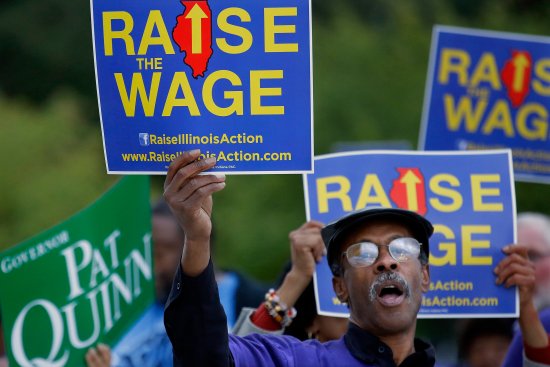
State wins for minimum wage ballot proposals show that raising the floor on pay has bipartisan appeal
Voters in Alaska, Arkansas, Nebraska, and South Dakota chose to increase their states’ minimum wages Tuesday, while those in San Francisco opted to start paying workers $15 per hour, matching the national high.
In Alaska, an overwhelming 68% of voters endorsed a minimum wage increase to $9.75 by 2016. In Arkansas, 65% of voters said “yes” to bumping the current minimum of $6.25 (many businesses still had to pay the federal minimum of $7.25) to $8.50 by 2017. Voters were almost as enthusiastic in Nebraska, with 59% approving a bump from $7.25 to $9 by 2016.
The vote was closer in South Dakota, with 55% of voters supporting a hike from $7.25 to $8.50 an hour by 2015.
See Where America Votes
[time-brightcove not-tgx=”true”]

















The raises happened despite big losses for Democrats in all those states. Late Tuesday just a single Democratic candidate was poised to win a federal election among them, even though the party made the issue a key political priority. Such a strong consensus for raising the minimum wage shows bipartisan support for an issue that has been contentious in Washington, where Obama and many congressional Democrats have backed raising the federal minimum wage to $10.10 by 2016.
Republicans say that while raising the minimum wage would push many workers above the poverty line, it would likely cost many others their jobs. A Congressional Budget Office report found that raising the minimum wage to $10.10 could result in job losses of 500,000, while leading to higher incomes for an estimated 16.5 million workers.
The increase in San Francisco will be phased in over time, reaching $15 by 2018. Early voting counts showed more than 76% of voters opting to match Seattle for offering the highest minimum wage in the nation (though Seattle has been taken to court over its ordinance).
In Illinois, 66% of voters supported a non-binding resolution to raise the minimum wage to $10 by 2015. And on the East Coast, Massachusetts voters made their state the third in the nation to require paid sick leave for workers, after Connecticut and California.